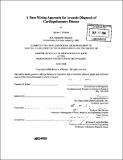A data mining approach for acoustic diagnosis of cardiopulmonary disease
Author(s)
Flietstra, Bryan C
DownloadFull printable version (47.90Mb)
Other Contributors
Massachusetts Institute of Technology. Operations Research Center.
Advisor
Natasha Markuzon and Roy Welsch.
Terms of use
Metadata
Show full item recordAbstract
Variations in training and individual doctor's listening skills make diagnosing a patient via stethoscope based auscultation problematic. Doctors have now turned to more advanced devices such as x-rays and computed tomography (CT) scans to make diagnoses. However, recent advances in lung sound analysis techniques allow for the auscultation to be performed with an array of microphones, which send the lung sounds to a computer for processing. The computer automatically identifies adventitious sounds using time expanded waveform analysis and allows for a more precise auscultation. We investigate three data mining techniques in order to diagnose a patient based solely on the sounds heard within the chest by a "smart" stethoscope. We achieve excellent recognition performance by using k nearest neighbors, neural networks, and support vector machines to make classifications in pair-wise comparisons. We also extend the research to a multi-class scenario and are able to separate patients with interstitial pulmonary fibrosis with 80% accuracy. Adding clinical data also improves recognition performance. Our results show that performing computerized lung auscultation offers a low-cost, non-invasive diagnostic procedure that gives doctors better clinical utility especially in situations when x-rays and CT scans are not available.
Description
Thesis (S.M.)--Massachusetts Institute of Technology, Sloan School of Management, Operations Research Center, 2008. Includes bibliographical references (p. 107-111).
Date issued
2008Department
Massachusetts Institute of Technology. Operations Research Center; Sloan School of ManagementPublisher
Massachusetts Institute of Technology
Keywords
Operations Research Center.